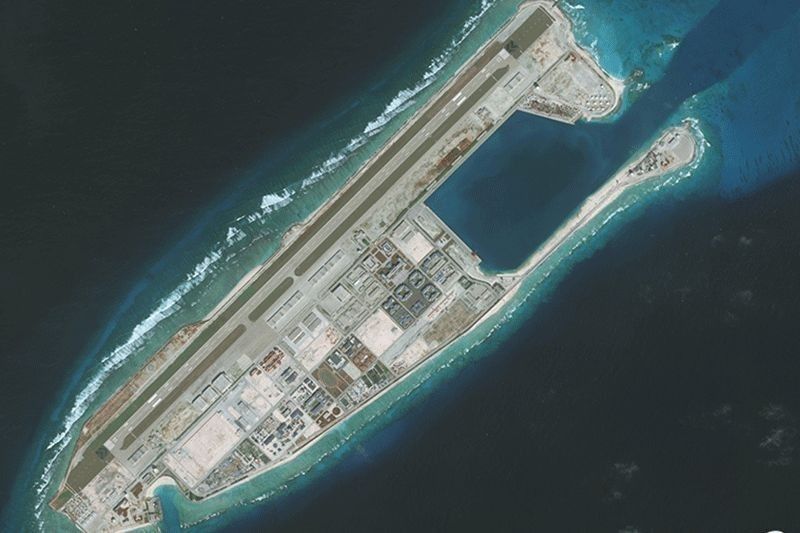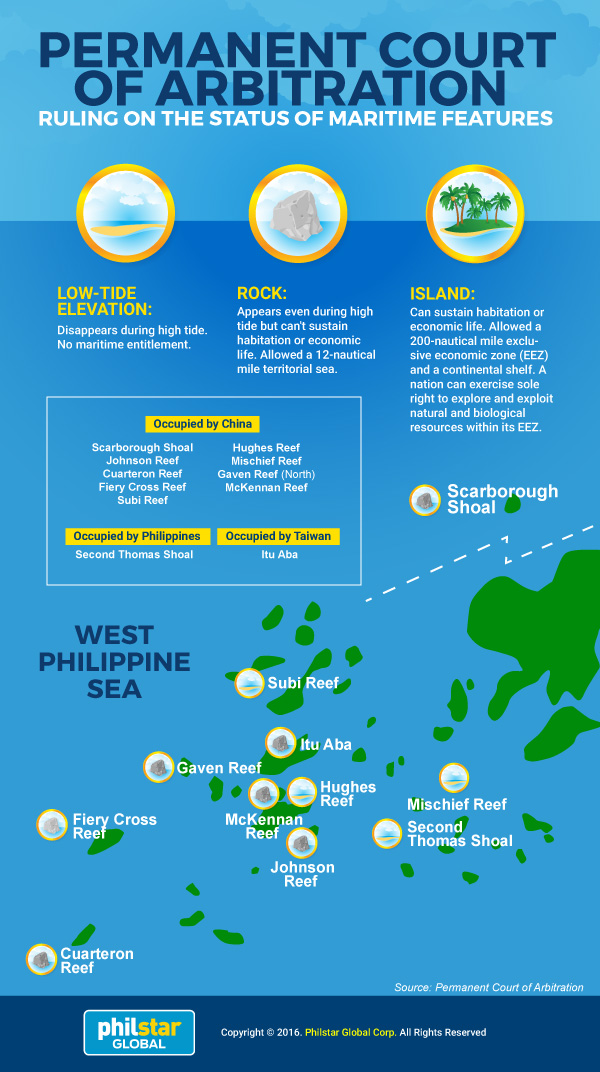How the Hague court ruled on the Philippines’s 15 arguments
July 13, 2016 | 8:01pm

This Jan. 1, 2018 satellite image shows China's installations on Fiery Cross Reef in the Spratly Islands.
DigitalGlobe via CSIS/AMTI
MANILA, Philippines (Lead photo updated March 21, 2019, 6:51 p.m.) — At the heart of the Philippines's case against China are two arguments: the nine-dash line is invalid and none of the features in Spratlys Islands and Scarborough Shoal are islands.
Whether a feature is an island, a rock or a low-tide elevation decides if it has maritime entitlement or none at all.
The Permanent Court of Arbitration (PCA) released its final and legally binding award on the case on Tuesday answering the 15 submissions made by Manila.
How did the tribunal rule on each argument?
(1) China’s maritime entitlements in the South China Sea may not extend beyond those permitted by the United Nations Convention on the Law of the Sea (UNCLOS)
The tribunal in its unanimous award said China's claims cannot extend beyond the limits imposed by the UNCLOS, which Beijing ratified in 1996.
(2) China’s claims to sovereign rights jurisdiction within the “nine--dash line” that exceed its entitlements under UNCLOS are invalid
The tribunal ruled that China’s claims to historic and sovereign rights within its “nine-dash line” are invalid. The tribunal said the claims are in conflict with the UNCLOS as they exceed the geographic and substantive limits of China’s maritime entitlements.
(3) Scarborough Shoal is a rock, therefore, generates no entitlement to an exclusive economic zone or continental shelf
Submissions 3 to 7 of the Philippines deals with the status of maritime features in the South China Sea. Manila asked the tribunal to decide whether a feature is a low-tide elevation, a rock or an island in accordance with the UNCLOS. The difference would decide if it merits maritime entitlement or none at all.
A low tide elevation, as suggested by its name, only appears during low tide. It has no maritime entitlement and cannot be occupied as a territory.
A rock, though visible even during high tide, cannot sustain habitation or economic life. It is allowed only a 12-nautical mile territorial sea and has no exclusive economic zone (EEZ) or continental shelf.
An island, meanwhile, generates an entitlement to an EEZ of 200 nautical miles and to a continental shelf. The state that owns the island has the sole right to explore and exploit natural resources — oil, gas and minerals — and biological resources within its EEZ, while other states can still enjoy the freedom of navigation and overflight.
The tribunal ruled that Scarborough Shoal is a rock. The tribunal also said that the UNCLOS classifies a feature on the basis of its natural condition referring to artificial islands built by China in the disputed waters.
(4) Mischief Reef, Second Thomas Shoal, and Subi Reef are low-tide elevations
The tribunal ruled the three are low-tide elevations.
(5) Mischief Reef and Second Thomas Shoal are part of the EEZ and continental shelf of the Philippines
The tribunal ruled that both Mischief Reef and Second Thomas Shoal are part of the EEZ and continental shelf of the Philippines as it is located within 200 nautical miles of the Philippines’s coast on the island of Palawan.
(6) Gaven Reef and McKennan Reef (including Hughes Reef) are low-tide elevations
The tribunal disagreed with the Philippines and declared the two features as rocks as they are naturally formed areas of land which are above water at high tide.
(7) Johnson Reef, Cuarteron Reef and Fiery Cross Reef are rocks
The tribunal agreed that Johnson Reef, Cuarteron Reef and Fiery Cross Reef are rocks.

(8) China has unlawfully interfered with the Philippines’s exercise of sovereign rights over its EEZ and continental shelf
As Mischief Reef, Second Thomas Shoal and Reed Bank are within Philippines’s EEZ, the tribunal found that Beijing violated Manila’s sovereign rights by interfering with Philippine petroleum exploration, prohibiting fishing by Philippine vessels, failing to prevent Chinese fishermen from fishing and constructing artificial islands without authorization.
(9) China has unlawfully failed to prevent its nationals and vessels from exploiting the living resources in the EEZ of the Philippines
The tribunal ruled that China failed to exhibit due regard for the Philippines’s sovereign rights with respect to fisheries in the latter’s EEZ. It said Beijing breached obligations stated under Article 58(3) of the UNCLOS which covers the rights and duties of other states in the EEZ when it failed to prevent Chinese vessels from fishing at Mischief Reef and Second Thomas Shoal in May 2013.
(10) China has unlawfully prevented Philippine fishermen from pursuing their livelihoods by interfering with traditional fishing activities at Scarborough Shoal
The tribunal ruled that fishermen from the Philippines, China and other countries had long fished at Scarborough Shoal and had traditional fishing rights in the area. However, it found that China failed to respect traditional fishing rights of Filipino fishermen by preventing access to the shoal after May 2012.
The tribunal also noted that it would reach the same conclusion if ever the Philippines prevents Chinese fishermen from accessing the shoal.
(11) China has violated its obligations under the UNCLOS to protect and preserve the marine environment at Scarborough Shoal, Second Thomas Shoal, Cuarteron Reef, Fiery Cross Reef, Gaven Reef, Johnson Reef, Hughes Reef and Subi Reef
The tribunal found that China violated Articles 192 and 194(5) of the UNCLOS due to its failure to prevent Chinese fishing vessels from engaging in harmful harvesting activities of endangered sea turtles, coral, and giant clams on a substantial scale in the South China Sea at Scarborough Shoal, Second Thomas Shoal and other features in the Spratly Islands.
Articles 192, 194(1), 194(5), 197, 123 and 206 were also violated by Beijing with its island-building activities at Cuarteron Reef, Fiery Cross Reef, Gaven Reef (North), Johnson Reef, Hughes Reef, Subi Reef and Mischief Reef.
(12) China’s occupation of and construction activities on Mischief Reef violate UNCLOS provisions concerning artificial islands and structures. Beijing’s duties to protect and preserve marine environment and constitute unlawful acts of attempted appropriation
The tribunal found that China’s construction of artificial islands at Mischief Reef without authorization from the Philippines breached the UNCLOS. It added that, as a low-tide elevation, Mischief Reef is not capable of appropriation as a territory.
(13) China has breached its obligations under the UNCLOS by operating its law enforcement vessels in a dangerous manner in the vicinity of Scarborough Shoal
The tribunal ruled that the conduct of Chinese law enforcement vessels in the vicinity of Scarborough Shoal created serious risk of collision and danger to Philippine vessels and personnel.
(14) Since the commencement of this arbitration in January 2013, China has unlawfully aggravated and extended the dispute by:
(a) interfering with the Philippines’s rights of navigation in the waters at, and adjacent to, Second Thomas Shoal
(b) preventing the rotation and resupply of Philippine personnel stationed at Second Thomas Shoal
(c) endangering the health and well-being of Philippine personnel stationed at Second Thomas Shoal
(d) conducting dredging, artificial island-building and construction activities at Mischief Reef, Cuarteron Reef, Fiery Cross Reef, Gaven Reef, Johnson Reef, Hughes Reef and Subi Reef
The tribunal found that it lacks jurisdiction to consider the Philippines’s Submissions No. 14 (a) to (c). However, it said China has failed in its duty to refrain from aggravating the disputes during the settlement process with its large-scale construction of artificial islands at seven features in the Spratlys Islands.
(15) China shall respect the rights and freedoms of the Philippines under the UNCLOS and comply with its duties under the Convention
The tribunal told both parties they are obliged to comply with the UNCLOS, including its provisions regarding the resolution of disputes, and to respect the rights and freedoms of other states under the Convention.
BrandSpace Articles
<
>
Philstar
- Latest
Latest
Latest
December 8, 2024 - 9:00am
By Jing Castañeda | December 8, 2024 - 9:00am
November 30, 2024 - 5:19pm
By Joanna Perfecto | November 30, 2024 - 5:19pm
November 23, 2024 - 6:23pm
By Rupert Paul Manhit | November 23, 2024 - 6:23pm
November 23, 2024 - 1:52pm
By Edilberto de Jesus | November 23, 2024 - 1:52pm
November 14, 2024 - 7:00am
By Cielo Magno | November 14, 2024 - 7:00am
November 9, 2024 - 3:31pm
By Rupert Paul Manhit | November 9, 2024 - 3:31pm
Recommended
























